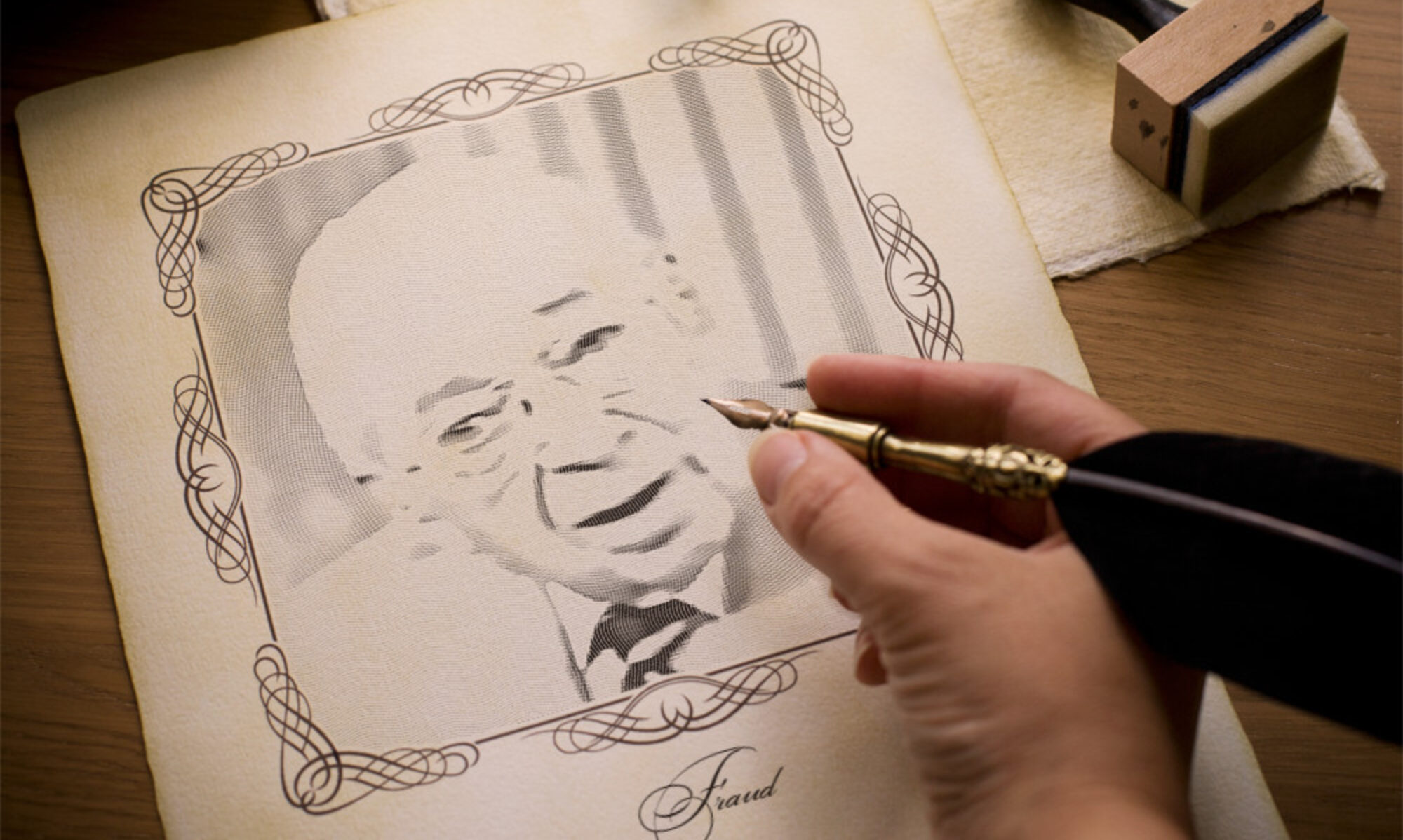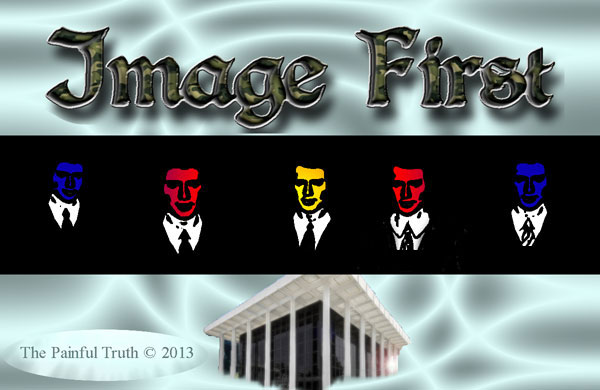
Herbert Armstrong claimed that he was the very first to bring the gospel of the Kingdom of God to this earth in over 1,900 years. The gospel Herbert Armstrong brought was far different from the one described in the New Testament — the Apostle Paul told the Corinthians, “For I determined not to know any thing among you, save Jesus Christ, and him crucified” and told the Romans, “For I am not ashamed of the gospel of Christ: for it is the power of God unto salvation to every one that believeth; to the Jew first, and also to the Greek.” The gospel of Christ was one of redemption. Herbert Armstrong brought a far different gospel — not of the person of Jesus, but of a kingdom of laws, rulers, power and a fierce hierarchy with little room for sinners. To attain this ‘kingdom’ of power, glory and authority, you would have to be absolutely PERFECT! In fact, there was so little latitude for those with flaws, Herbert Armstrong had the perspective that only he had a lock on salvation and that the members of the Worldwide Church of God did not: The only use he had for them was related to how well they served and supported him as God’s Apostle and they might have salvation on his coattails depending on how well they fulfilled their subservient role. He saw the members as lesser ciphers which he held in contempt.
He had this attitude early on in his ministry as he told the story of when he met the leaders of the Church of God Seventh Day: He did not sense in them greatness and power — they were too ordinary, after all, he had dealt with multimillionaire Corporate CEOs and highly placed executives in major American Corporations. He viewed those not exuding the personal high power of Corporate Executives as being beneath him. In fact, when he was reduced to financial hardship, he was not only embarrassed to do manual labor, he was embarrassed to associate with the ‘simple folk’ of the Church of God. He was just out of place, having to deal with the lowly and humble, particularly since he had not only associated with the high powered Corporate types, but also since he spent so much time at the Central Library in Portland, Oregon where he had found the writings of G. G. Rupert, which in his mind — with its focus on Old Testament physical rituals, such as the feasts and British Israelism — was an enlightenment far beyond what the simpletons of the Church of God Seventh Day knew. He, as a novice, attempted to enlighten them without success, their having rejected his wrong-headed heresies.
This was too much for Herbert: He was great, he knew he was great — and superior too — and they didn’t have his understanding, wisdom and vision. At the same time, for the first 10 years from the beginning of his ministry, he committed incest with his daughter, which, undoubtedly, gave him the feeling of power with the complete domination of another human being who was at his mercy. It is fairly clear that Herbert Armstrong never really repented and did not have anything which could be deemed to be conversion. Add to that the record of his being difficult and uncooperative with the other ministers of the Church of God and the record is complete. In Chapter 23 of his book, The Journey: A History of the Church of God (Seventh Day), Robert Coulter clearly demonstrates that Herbert Armstrong was a liar and he also broke his pledge with the church. Herbert Armstrong insisted that he broke away from association with the Church in 1933, but actually continued until 1938 as one of the Salem Church’s seventy evangelists and reports in The Advocate show this very clearly. Mr. Coulter added this observation in “Demise of Armstrong’s church empire”:
But Armstrong, like most autocrats, reigned over his religious kingdom. Unilaterally he always had the last word! And as usually happens with autocrats, he failed to develop a plan for the succession of leadership in his church. During his lifetime, Armstrong assumed that the title of apostle and may have become a victim of the speculation of some of his members and clerics who reportedly speculated he would “live until Christ returned to establish his kingdom”.
Mr. Coulter adds:
God forbids gloating over the calamity of an individual. But if one believed in church eras, Armstrong’s church of his assumed Philadelphia era was short-lived and now looks more like the Laodicean church. It was advised, “You do not realize that you are wretched, pitiful, poor, blind and naked” (Revelation 3:17, NIV).
Armstrong’s Philadelphia church has disappeared, while the Church of God (Seventh Day), which he described as Sardis, never experienced the “flash in the pan,” wealth or prominence he enjoyed. But it still lives! It continues to travel toward God’s eternal Kingdom proclaiming the gospel of Christ. It had no allusions of grandeur for itself. Its pace, while slow and faltering at times, never has been flashy, but its worldwide membership is approaching four hundred thousand, which matches or exceeds that of Armstrong’s church at the height of its glory.
As for the glory Herbert Armstrong enjoyed, he was a Corporate CEO of a multimillion dollar world wide enterprise with a central headquarters with some impressive facilities, including an IBM Mainframe and full scale printing presses. While it was a small to medium corporation, it had the trappings of a major modern corporation, replete with all the internal politics and problems.
 Those who have not experienced life as a manager in a Fortune 500 company as I have as a Manager at Weyerhaeuser simply cannot understand what it is like. The best guide is Moral Mazes: The World of Corporate Managers. It isn’t just about the fact that what is right and moral is what the guy above you wants from you — it’s a whole superstructure hierarchy geared to amoral preservation of existence whose central core is that the end justifies the means. The book contains:
Those who have not experienced life as a manager in a Fortune 500 company as I have as a Manager at Weyerhaeuser simply cannot understand what it is like. The best guide is Moral Mazes: The World of Corporate Managers. It isn’t just about the fact that what is right and moral is what the guy above you wants from you — it’s a whole superstructure hierarchy geared to amoral preservation of existence whose central core is that the end justifies the means. The book contains:
- Introduction: Business as a Social and Moral Terrain
- Moral Probations, Old and New
- The Social Structure of Managerial Work
- The Main Chance
- Looking Up and Looking Around
- Drawing Lines
- Dexterity with Symbols
- The Magic Lantern
- Invitations to Jeopardy
- Moral Mazes and the Great Recession
It’s appalling and I’ve experienced it personally. There is a certain surreal quality to what can be laughingly called reality — an interaction of dysfunctional environment with distorted perception. If you experienced this for yourself, you would seriously be questioning your sanity — not that it made any difference because as a sane person among crazies, you simply aren’t any better off in such a disturbingly chaotic insane asylum. You should pay attention to The Magic Lantern which is used to shape people’s opinions about the unreality of the Corporation: Every effort is made to make truth disappear to supplant it with feel-good emotions evoked by image making. A good example of this is the Ethyl Corporation making Carbon Tetraethyllead to prevent engine knock as an additive to gasoline, ending up progressively poisoning the world. We can all appreciate the the quote from the THE JUNGLE by Upton Sinclair that “It’s nearly impossible to convince a man of anything when his paycheck depends on it being otherwise”. Corporations do appalling things to survive and it’s especially bad when the corporation is headed by a wrong-headed autocrat. The Magic Lantern in the hands of an expert advertising marketer such as Herbert Armstrong can make the crazy, dangerous and expensive look benign and appealing — consider the topic of three tithes in lesser hands.
If there is one thing we know about The Corporation, it is that it is soulless without a conscience, a non person person which is relentless in its goals without regard to humanity. This is what the Worldwide Church of God became under Herbert Armstrong with the ever expanding goal to influence more and more people. It is what the core of the Armstrongist churches is about today. Make no mistake, I gave United Weyerhaeuser corporate documents which were incorporated into their ‘governance’ — which is why the Council’s endless discussions of exactly the right word and phrase in their organizational documents made the minutes of the meetings look like Novocaine in print. Along with the other sects of the Cult of Herbert Armstrong Mafia, it is The Church Corporate with little internally to even imply there is a spiritual side to the business.
What Herbert Armstrong was pushing as the Kingdom of God was nothing more than his vision of The Corporation of God™ replete with God as CEO, Christ as President, himself as one of the high ranking executive vice presidents and a very strong powerful hierarchy of laws, standards and procedures very much like a modern American multinational corporation — or maybe the 1800s version of the same. Be sure that it has a dress code. You can be assured that there are definite classes in a highly defined class structure. Unlike modern politically correct corporation (that way because it’s easier than dealing with litigation from the government), women are lesser creatures relegated to Their Place as are those of races other than whites. There certainly are favorites.
God as CEO isn’t that nicey-nice, lovey-dovey, kind, grandfatherly type of warm and fuzzy deity. He’s harsh, hard, implacable, nasty, arbitrary, touchy with a vile nasty temper and you never know what will set Him off to send floods to Texas, drought to California, earthquakes, tsunamis, lightening strikes for forest fires, mud slides, volcanoes or even an asteroid or two. He’s a God of Power and He exercises it in a reign of terror. As CEO of The Corporation of God™ He knows His brand of justice and fires people (as in the lake of fire) when they do not measure up to His impossible and secret standards of perfection. His Office is a place where even angels fear to tread.
And as it is in many corporations and as I have seen for myself, there is going to be a great deal of boozing going on. The Corporation of God™ doesn’t just allow alcohol, it promotes it. Wine cheers the hearts of God and man, don’t you know. Herbert Armstrong won’t have to give up Dom Perignon as it will be a staple in his diet, unless there is a higher quality vintage that’s more expensive. Know too that those in the upper echelons will have the nicer stuff, not available to the ones on the lower rungs of the God Corporate (“Hurray, we’re on the bottom” as Gerald Waterhouse would say). Rank, privilege and power along with heaps of lots of narcissistic source attention will be granted to such as Herbert Armstrong by the rest of the few of us who make it, albeit by accident. (I’ve seen the corporate drinking parties first hand and it’s just another reason I abstain — note that the old guard Church of God Seventh Day ministers are not in favor of drinking alcohol, which might have been another minor incentive for Herbert Armstrong to jump ship.)
What is the real reason Herbert Armstrong would promote The Corporation of God™ instead of the Biblical Kingdom of God?
It’s the only thing he knew.

